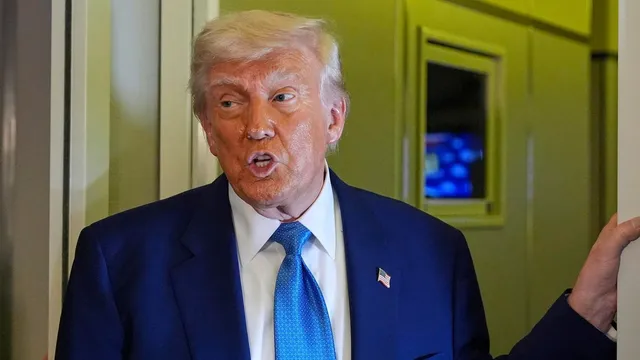
Donald Trump attacks Taylor Swift and Bruce Springsteen on social media
2025-05-20 04:02- Donald Trump launched attacks on musicians Taylor Swift and Bruce Springsteen in Truth Social posts.
- Both artists have been vocal critics of Trump and have engaged in public disputes with him.
- These comments reflect Trump's ongoing strategy of challenging those in entertainment who oppose him.
Express your sentiment!
Insights
In recent days, Donald Trump has reignited his ongoing feud with pop star Taylor Swift and rock musician Bruce Springsteen. Trump, who is currently navigating the political landscape post-presidency, took to Truth Social to target both musicians, citing their vocal criticisms of his political career and recent endorsements for Democrats. After attending an Eagles White House celebration while flying back from a Middle East trip, Trump questioned Swift’s popularity, expressing that she is no longer 'HOT' since he declared, 'I HATE TAYLOR SWIFT'. This marks a continuation of Trump's history of disparaging artists who do not align with his political views, which has included several attacks since Swift backed Kamala Harris for the 2024 election. The criticism of Springsteen followed a similar pattern, showcasing Trump's disdain for entertainers who publicly oppose him. He labeled Springsteen a 'highly overrated' musician and suggested he should keep quiet while abroad. Trump's posts reflect his tendency to lash out at those in the entertainment industry who critique his presidency or support his political opponents, furthering the dynamic of celebrity politics intertwined with his narrative. Interestingly, Trump’s remarks coincided with his broader political strategy, as he continued to express personal grievances against various figures in the entertainment world. Notably, Swift had maintained a lower public profile post-Eras Tour but remains a target for Trump due to her past endorsements and outspoken criticism. The context of Trump's remarks comes amid discussions regarding political endorsements by high-profile artists, which have been seen as influential in shaping public opinion, particularly among younger voters. As Trump returns to the political forefront, his targeting of celebrities like Swift and Springsteen may resonate with certain segments of his base but could also alienate moderates within the electorate. This approach is reflective of his previous campaign tactics, where cultural issues often played a central role in rallying supporters. Trump's engagement with these artists serves to reinforce his anti-establishment persona, even as it raises questions about the implications for his public image among constituents who are fans of these artists. Ultimately, the ongoing feud illustrates the intersection of celebrity culture and political discourse that continues to characterize the current political landscape.
Contexts
The influence of celebrity opinions on politics has become a significant phenomenon in modern society. Celebrities, by virtue of their public status, can shape public opinion and mobilize large groups of followers. This power has been utilized in various political movements, where celebrity endorsements have the potential to sway undecided voters and create heightened awareness around specific issues. The rise of social media platforms has accelerated this trend, offering celebrities a direct channel to reach their audiences without the filter of traditional media. Consequently, the voices of celebrities resonate in political discussions, for better or worse, impacting the democratic process. One of the most notable aspects of celebrity involvement in politics is their ability to bring attention to social justice issues. Figures such as Oprah Winfrey, Taylor Swift, and Leonardo DiCaprio have used their platforms to advocate for causes ranging from climate change to racial equality. Their endorsements can lead to a surge in grassroots movements, mobilizing fans and followers to engage in activism. Additionally, many celebrities have participated in fundraising efforts for political campaigns, further solidifying their role as influential figures in the political arena. This demonstrates how the intersection of fame and advocacy can create powerful alliances that amplify critical voices and drive social change. However, the involvement of celebrities in politics is not without controversy. Critics argue that fame does not equate to expertise, and celebrity opinions may overshadow more informed discourse. This concern is amplified when celebrities express opinions on complex political matters without fully understanding the implications of their statements. The phenomenon can lead to a culture where popularity outweighs substance, raising questions about the quality of public discourse. Furthermore, there is the risk of polarization, where fans align themselves with their favorite celebrity's political stance, creating echo chambers that can hinder constructive dialogue across different viewpoints. In conclusion, the impact of celebrity opinions on politics is both profound and multifaceted. While celebrities can effectively highlight critical issues and mobilize public support, their influence also poses challenges regarding the quality of political engagement and discourse. As society becomes increasingly interconnected through digital platforms, the role of celebrities in shaping political landscapes will likely continue to evolve. Understanding this dynamic is essential for grasping the complexities of modern politics and the factors that drive public opinion.